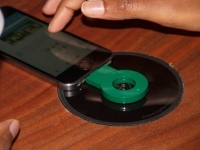
Seems like a no-brainer: Enable your smartphone so it can rest on the table and get an instant power charge without the fuss of cables. Who wouldn't want that feature, right?
It turns out that the realities of wireless charging have been anything but simple. Even if your smartphone happens to have the capability, there's a good chance it may not work with the charging station at Starbucks. And iPhone and iPad users are out of luck, given that Apple refuses to embrace the technology.
Now you can add legal infighting among board members of a key wireless-charging company to the list of reasons why you probably won't be able to top off your smartphone at the local coffee shop anytime soon.
Three board members of Israel-based Powermat Technologies sued the company and CEO Thorsten Heins in late October, arguing that Heins is operating without an approved budget and steering the business into insolvency, according to court documents filed in Israel and reviewed by CNET. In the company's legal response also seen by CNET, Powermat called the complaint "deficient, biased, distorted and deceptive."
Powermat further defended itself in a statement last week. "By revealing these and other details about the company's turnaround, Powermat is optimistic that the court will see through the substantial misstatements and malicious half-truths," the company said.
The legal drama comes as things were starting to look up for wireless charging. Over the past year, Powermat had managed to expand its number of charging locations sevenfold for a total of 1,400. Samsung incorporated Powermat's technology into flagship smartphones like the Galaxy S6 and has heavily promoted the feature. Powermat had also settled a long-standing rivalry with another wireless-charging group, igniting the potential for more compatibility between devices and charging stations.
The lawsuit, which seeks to restrict Powermat from proceeding with its current budget, could kill any momentum for the embrace of wireless charging. Even a temporary slowdown could hamstring the company's push to create a more commonly accepted standard for wireless charging. A roadblock could also hurt the company's chances of getting the tech into more mobile products or of bolstering the number of charging stations.
It's another headache for Heins, who had previously tried, and failed, to turn around smartphone maker BlackBerry before exiting as CEO in late 2013.
Heins filed his own affidavit in the Powermat suit, disputing the claims of his antagonists and defending his actions.
"It is clear that the accusations the petitioners are making against me and my management team are baseless," he said in the affidavit.
The lawsuit, meanwhile, alleges a "serious trust crisis" in the company's board that worsens every day.
Adding to the drama, one of the board members suing Powermat is Ran Poliakine, founder and former chairman and CEO of the company. Late last year, Poliakine volunteered to step down and take a reduced role amid investor pressure, which was part of an agreement that led to tthe hiring of Heins.
He's clearly being more active now.

